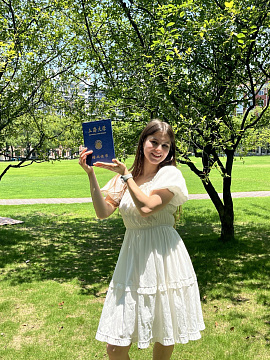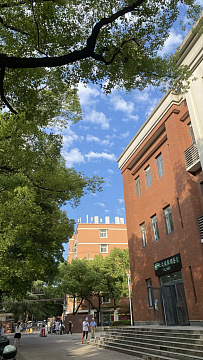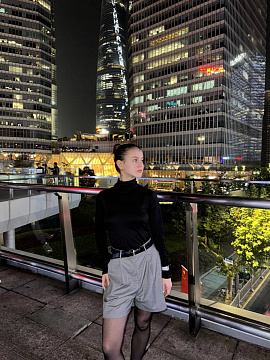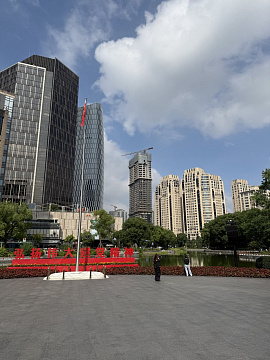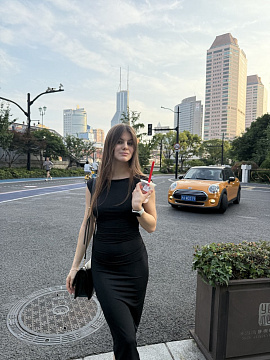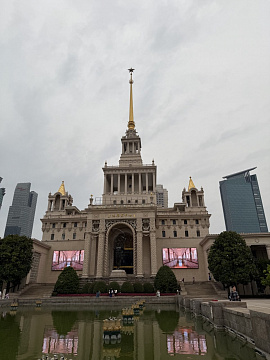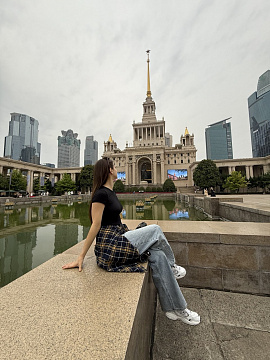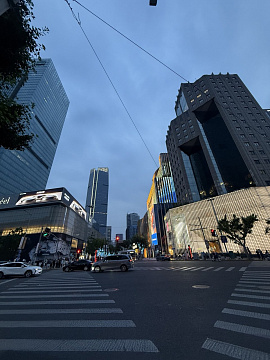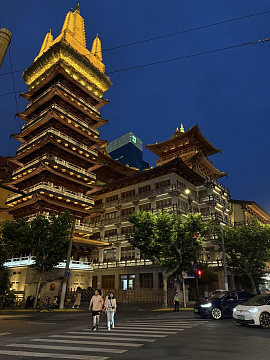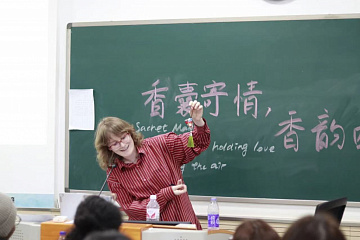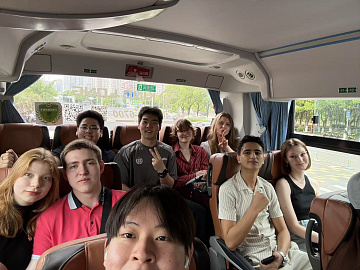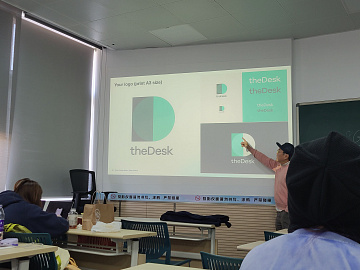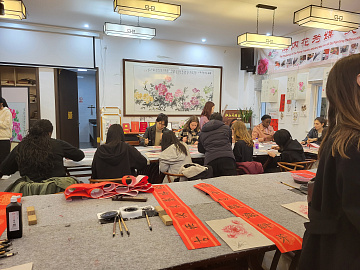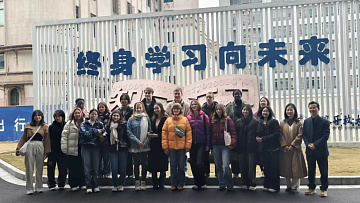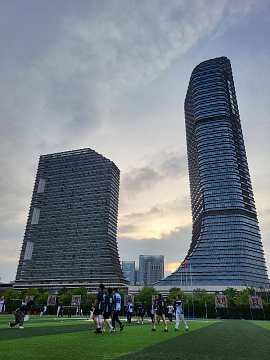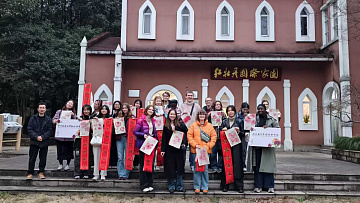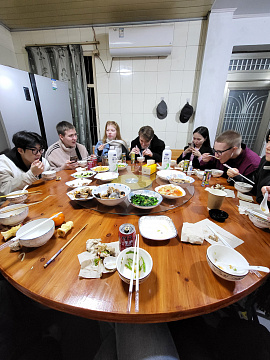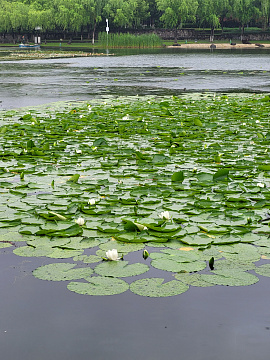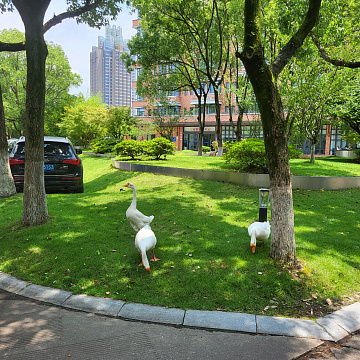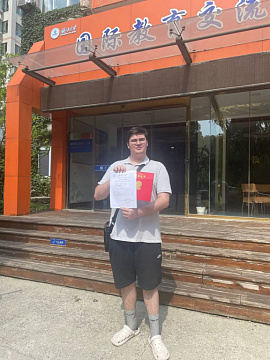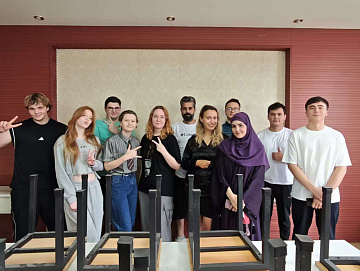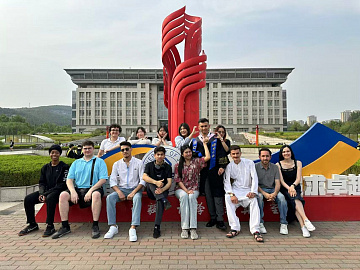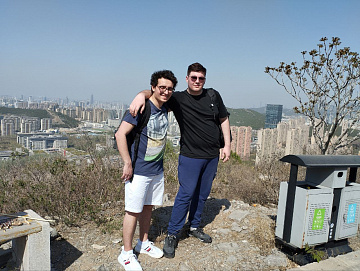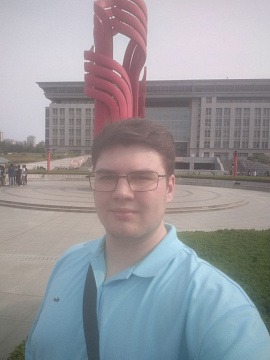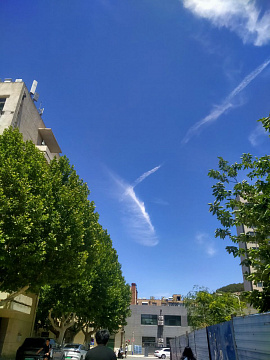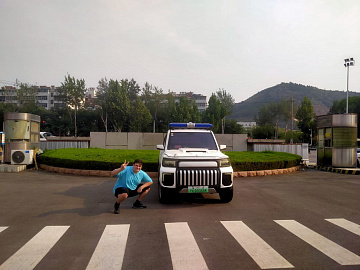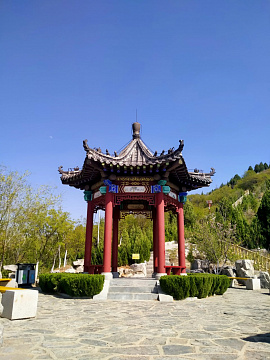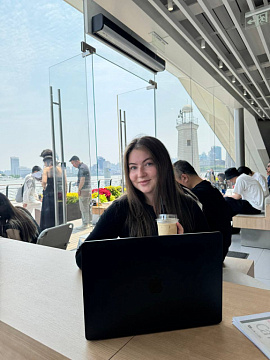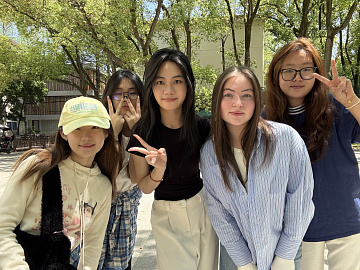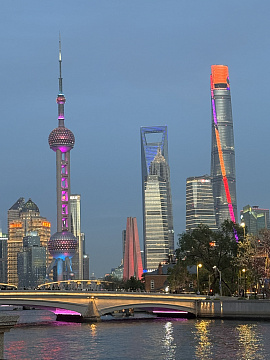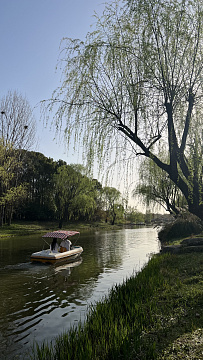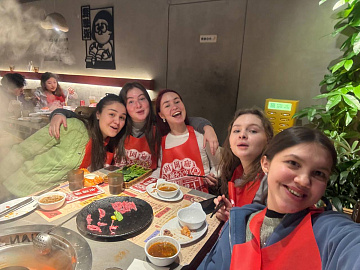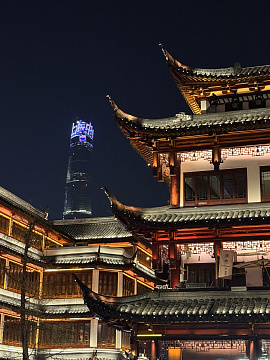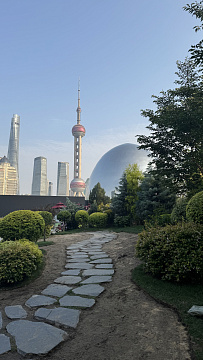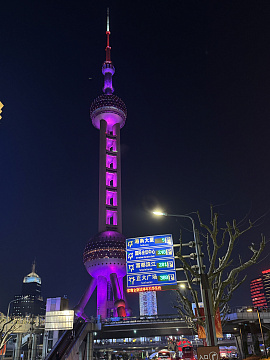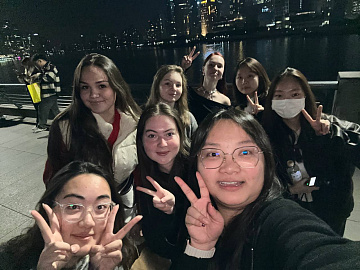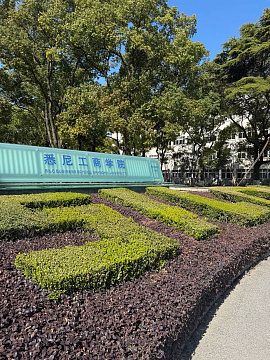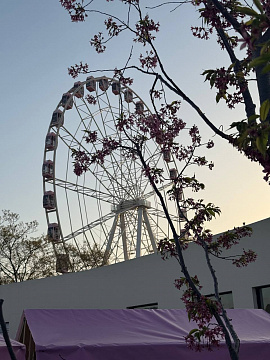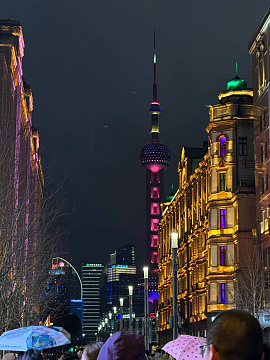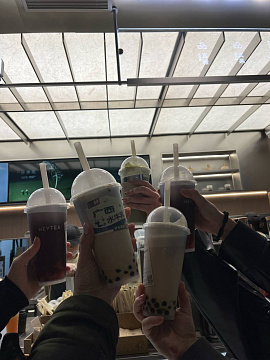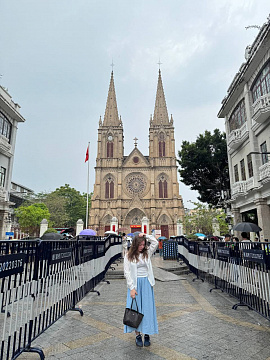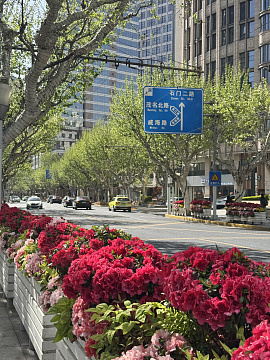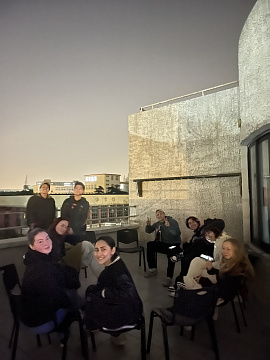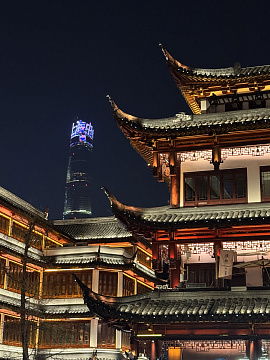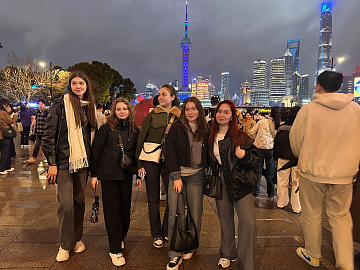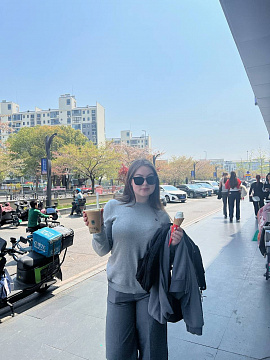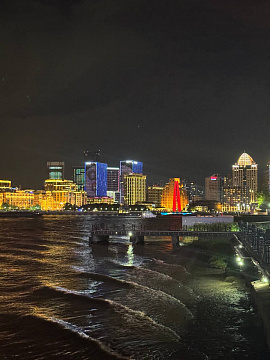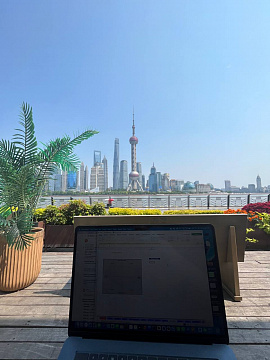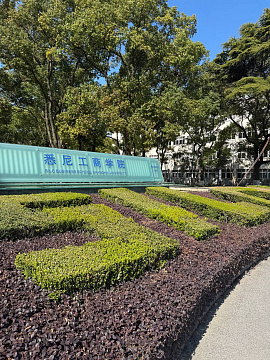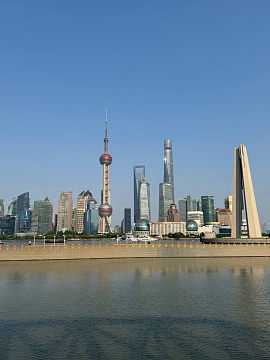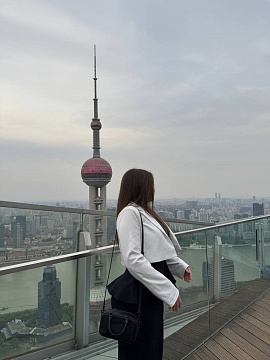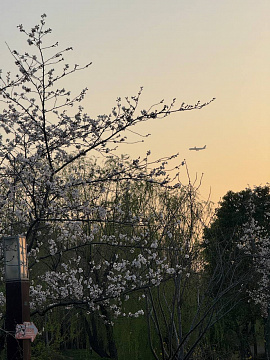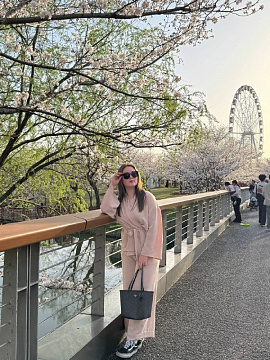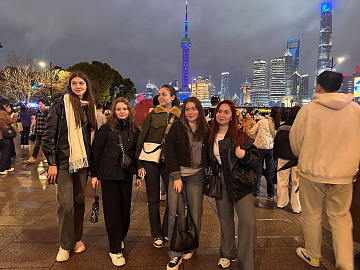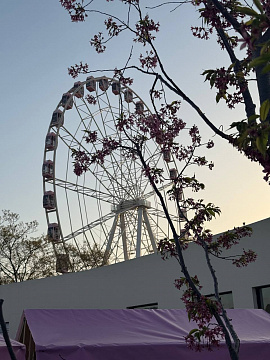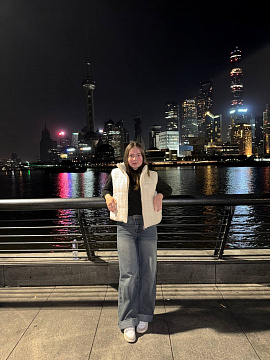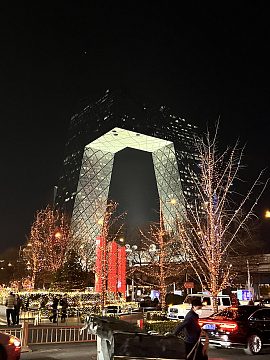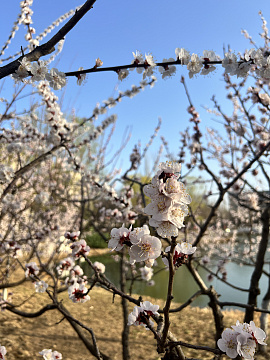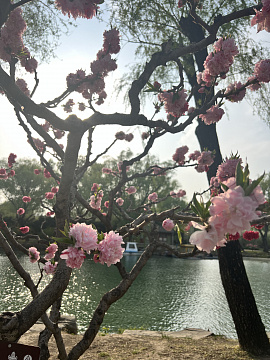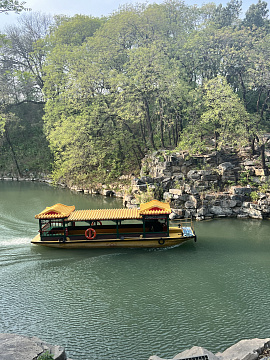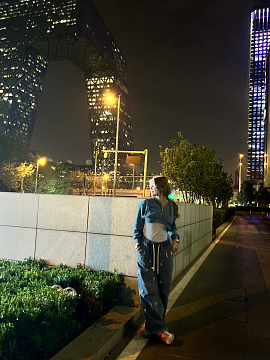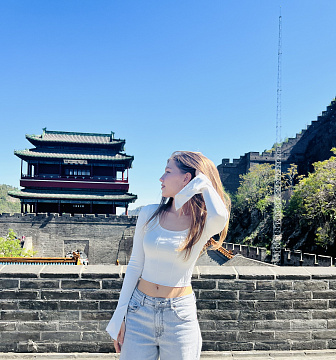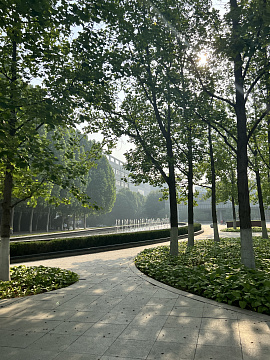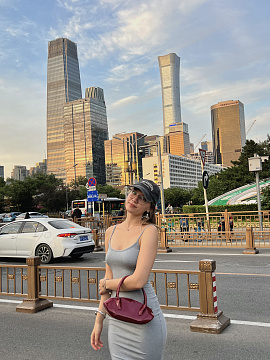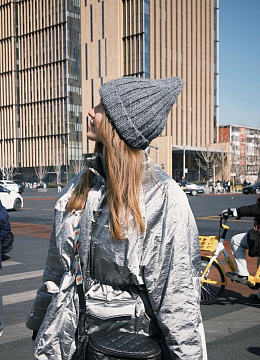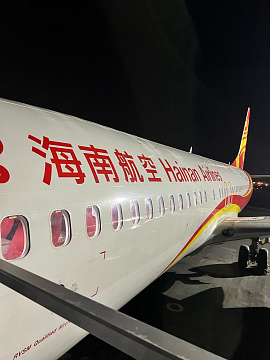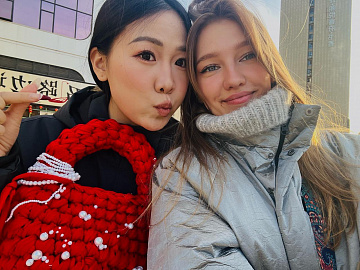
The internship left extremely positive impressions! During my year of study in China, I managed to achieve significant results: my level of Chinese language has increased significantly, especially in terms of speaking practice and understanding speech by ear. I have not only improved my academic knowledge, but also learned to communicate more freely in everyday and educational situations. Immersion in the language environment was a huge advantage: I constantly practiced Chinese with native speakers, made many friends from different countries, and also got to know the local traditions and culture better. In addition, this year I was able to explore Shanghai, its sights and the lives of the locals in more detail, which gave me a deeper understanding of China as a whole. This internship proved to be extremely useful both academically and personally. Academically, I have significantly improved my language level, and personally, I have become more independent, open to new things, and confident in communicating with people from different cultures.
What difficulties did you have during the preparation stages for the internship? What tips and recommendations can you give to future participants of the academic mobility program?
The one-year internship in China allowed not only to significantly improve the level of language proficiency, but also to gain valuable experience in overcoming various difficulties typical of a long stay in a different cultural environment. The most significant difficulties have arisen in the financial sector. Blocking a Russian bank card required a prompt search for alternative solutions. I had to study the local banking system in detail, master the procedure for opening an account in a Chinese bank and work out the mechanisms of money transfers. This experience has demonstrated the importance of preparing several financial strategies in advance. Digital adaptation presented significant difficulties. Functioning without Chinese mobile apps (Alipay, Didi, WeChat) significantly limited daily activities. The need to quickly master these services was particularly difficult, which required considerable time and patience.
Describe the visa application process. Your advice for future participants of the academic mobility program.
Preparing documents for a study visa to China was my first test before the trip. It seemed like a standard procedure, but it required an unexpected amount of attention and patience. The most difficult part was filling out the questionnaire. Each column required careful verification, from the exact spelling of the name in Latin to the correct dates. The submission of documents to the consulate was quieter, but there were some nuances. It turned out that photos must strictly comply with Chinese standards, and copies of documents must be perfectly clear. Fortunately, I clarified all the requirements in advance. Now, looking back, I understand that the main thing is to start preparing in advance and not be afraid to double—check every step. My advice to future interns is to create a checklist, make several copies of all the documents, and stay calm. Even if something goes wrong, any problem can be solved. And the excitement before applying for documents will seem ridiculous later, when you already find yourself in China!
What difficulties did you encounter upon arrival at the host foreign organization? Your advice to future participants of the academic mobility program.
The first few days after arriving in China turned out to be a real test of independence. Despite the preparation, I immediately encountered several unexpected difficulties. The main problem was the banal movement around the city. The address of the university and the dormitory seemed to be indicated in the documents, but it was difficult to find the right buildings without knowing Chinese. The taxi driver did not understand English, and navigation applications without a local SIM card worked intermittently. Solving everyday issues turned out to be no less difficult. Without a Chinese bank card, it was impossible to even pay for a subway ride or buy food in the cafeteria. And attempts to order water delivery to the hostel turned into a quest due to the language barrier. My main tips for future students:
1. Prepare a roadmap - print out the university and dormitory addresses in Chinese;
2. Open a bank account in the early days - it is impossible to connect Alipay/WeChat Pay without it;
3. Save the curator's contacts - he will help in emergency situations.
Indicate your expenses related to participation in an internship abroad (visa costs, cost of flight / travel to the place of internship, registration fees / taxes/ deposits in the host organization, policy / medical services, if used, travel by public transport, meals, accommodation. Your tips for cutting costs.
Basic expenses:
1. Visa costs: 2,500 rubles (the standard cost of a study visa)
2. Flight ~ 25,000 rubles. one way (it is better to book 3-4 months in advance)
3. Transfer: taxi from the airport — 100-120 yuan (~1,100-1300 rubles)
4. Accommodation: - Dormitory: - Single room: 120 yuan/night (~1,300 rubles) - Double room: 70 yuan/day (~760 rubles) - Four-bed: 40 yuan/day (~440 rubles) - Apartment rent: from 3,000 yuan/month (~33,000 rubles)
5. Meals: - Canteen: from 15 yuan/meal (~165 rubles) - Cafe/delivery: from 30 yuan (~330 rubles)
6. Transport: - Subway: 4-5 yuan/trip (~44-55 rubles) - Bus: 2-3 yuan (~22-33 rubles)
7. Medicine: insurance — 400 yuan (~4,400 rubles) for the entire period
Tips for saving money:
1. Accommodation: - Choose a double/quadruple dormitory — it is 2-3 times cheaper than a single option. - If you are planning a long internship, renting an apartment with a neighbor may be more profitable.
2. Meals: - Use the university canteen — the prices there are lower than in the cafe. - Cook by yourself: local markets offer cheap products (rice, vegetables, eggs).
3. Transportation: - Buy a transport card (for example, Shanghai Public Transportation Card) — often gives discounts. - Get around by bike (rent via Mobike/HelloBike — from 1 yuan/ride).
Bottom line: With reasonable planning, you can meet 40-50 thousand rubles / month (including accommodation, food and transport).

What difficulties did you have at the stages of preparation for the internship? What tips and recommendations can you give to future participants of the academic mobility program?
The only challenges were related to paperwork. It was very difficult to get everything signed and coordinated. I recommend starting the process well in advance because you might end up not going anywhere just because someone went on vacation or wasn’t available.
Describe the process of obtaining a visa. Your advice for future participants of the academic mobility program.
Getting a visa was the easiest part. You just gather all the documents, submit them, leave, and come back a week later to pick up nothing complicated about it.
What difficulties did you encounter upon arrival at the host foreign organization? Your advice to future participants of the academic mobility program.
I didn’t have any difficulties preparing for this internship because I already had experience with similar programs. For those who are about to go, I advise you not to be afraid. I’m sure everything that seems confusing or scary now will become clear once you arrive. Plus, the woman who will supervise you in China is amazing - she always helped us out.
Specify your expenses related to participation in an internship abroad (visa costs, cost of flight / travel to the place of internship, registration fees / taxes / deposits in the host organization, policy / medical services, if used, public transport, meals, accommodation. Your tips for cutting costs.
Living on campus costs around 20,000. We ate at cafés and restaurants all the time and often grabbed drinks to go, but it was still much, much cheaper than in Russia.
Flight expenses:
- Going there: 18,000 (flight) + 6,000 (train) + 1,500 (taxi)
- Return trip: 12,000 (flight) + 8,000 (train) + 1,500 (taxi)
Based on my experience, you’ll need about 48,000 per month to live comfortably and pay for the dormitory.

My impressions of the internship are extremely positive, primarily because I had the opportunity to visit China – a great country with a centuries-old history, where elements of modernity and tradition create a vibrant and fascinating picture. Academically, I also made some progress: for example, I used to struggle with understanding spoken Chinese, as the fast pace of native speakers seemed incomprehensible to me. However, living in an environment where most people were Chinese helped me improve not only my listening skills but also my speaking abilities; the longer I stayed in China, the more clearly people understood me when I spoke. On a personal level, I became more open to small talk, as the Chinese love to ask foreigners about their lives and culture, although sometimes the repetitive questions can be tiring. Overall, I really enjoyed my time in China and plan to visit again in the future.
What difficulties did you have at the stages of preparation for the internship? What tips and recommendations can you give to future participants of the academic mobility program?
As far as I remember, the only significant difficulty I faced during preparation was the baggage weight limit, as neither I nor my parents had much experience with traveling. My advice is to keep good, accurate scales at home so you don’t end up with unexpected excess baggage weight at the airport.
Describe the process of obtaining a visa. Your advice for future participants of the academic mobility program.
Getting a visa was not difficult for me. Sometimes it can be challenging to fill out everything alone because the screen seems overloaded with information at first, but all the instructions are available online. You can easily complete the application and submit it in one free evening.
What difficulties did you encounter upon arrival at the host foreign organization? Your advice to future participants of the academic mobility program.
Upon arriving at the dormitory, I had no trouble settling in – I got a great roommate from France who showed me what to do and how to arrange everything. My advice is to try to befriend your roommate and neighbors from nearby rooms, as you will be living with these strangers for a long time, and it’s better to establish good relations right away rather than leaving it to chance.
Specify your expenses related to participation in an internship abroad (visa costs, cost of flight / travel to the place of internship, registration fees / taxes / deposits in the host organization, policy / medical services, if used, public transport, meals, accommodation. Your tips for cutting costs.
· Visa – 2500 rubles per person.
· Plane tickets were bought separately: to Beijing – about 11,000 rubles without luggage, return – about 16,000 rubles with luggage.
· Train from Beijing to Jinan – 150–200 yuan (about 2000 rubles).
· City bus – 2 yuan (25 rubles).
· You can save money on marketplaces 拼多多 (Pinduoduo) and 淘宝 (Taobao) – prices are about twice as low as in stores.

What difficulties did you have at the stages of preparation for the internship? What tips and recommendations can you give to future participants of the academic mobility program?
Don't be afraid of anything, don't worry about what awaits you. In any case, you will get a wonderful experience and make new acquaintances. The fact that you will live in another country for such a long time is already very interesting, just enjoy every moment.
Describe the process of obtaining a visa. Your advice for future participants of the academic mobility program.
There were no problems with obtaining a visa. Just take care of it in advance.
What difficulties did you encounter upon arrival at the host foreign organization? Your advice to future participants of the academic mobility program.
The main thing upon arrival is to get from the airport to the university. Immediately prepare cash if you do not have an alipay and the opportunity to order a taxi online. Prepare the exact address of the dormitory, because one university may have several buildings. Don't be afraid to bargain with taxi drivers who will meet you right at the exit, because in the end they may have an adequate price for the trip.
Specify your expenses related to participation in an internship abroad (visa costs, cost of flight / travel to the place of internship, registration fees / taxes / deposits in the host organization, policy / medical services, if used, public transport, meals, accommodation. Your tips for cutting costs.
I bought a plane ticket back through trip.com you can buy a ticket for an international student there. Just sel ect the desired flight, scroll down, and in some cases "Foreign student" will be indicated, this option provides two bags and a low price. So I flew fr om Shanghai to Irkutsk for about 17 thousand rubles.

My impressions of the internship in China were multifaceted. The city moves at an incredible pace. I was amazed by its size and the widespread use of payment through WeChat Pay/Alipay, as well as the many rental bicycles. The first week was dedicated to exploring the area, getting familiar with the metro, Alipay, WeChat, and Baidu maps. Friendly locals always ready to help made this easier. I quickly made friends both among foreigners and Chinese, which helped me get to know the city faster. The atmosphere at the university was stimulating and friendly; teachers and students were very kind and responsive. There were often interesting events on campus, and you could always win something. Besides studying, I had time to explore the city itself. I visited many attractions, including the Forbidden City, Temple of Heaven, Summer Palace, and the Great Wall of China. Each trip added to the overall experience. Beijing gave me significant intercultural experience and inspired me for further development and career plans.
Academically, I managed to greatly improve my knowledge. I learned to work in teams with people fr om different countries, enhanced my command of economic terminology in English, and took Chinese language courses, which helped me better understand speech, hear tones, and speak. Personally, this experience increased my independence, adaptability, and self-confidence. Living alone in a completely different cultural environment taught me flexibility, patience, and problem-solving skills in unforeseen situations.
The only difficulty I faced during preparation was completing the medical examination quickly within the set deadlines, as there was initially a misunderstanding about the due date. Therefore, my advice is: if you do not understand or are unsure about the information, it’s better to ask immediately rather than at the last moment.
Describe the process of obtaining a visa. Your advice for future participants of the academic mobility program.
Fill out the online application form.Attend the consulate appointment as scheduled with the printed color documents (ADMISSION NOTICE, form DQ), along with copies and original passports.Then pay for the visa in cash at the bank. Carefully study the list of required documents to bring with you. In addition, start filling out the application form in advance, as many questions may arise during completion.
What difficulties did you encounter upon arrival at the host foreign organization? Your advice for future participants of the academic mobility program.
I did not encounter any difficulties.
Specify your expenses related to participation in an internship abroad (visa costs, cost of flight / travel to the place of internship, registration fees / taxes / deposits in the host organization, policy / medical services, if used, public transport, meals, accommodation. Your tips for cutting costs.
Visa – 2500 RUB
Flight there – ~14,000 RUB
Flight back – ~10,000 RUB
Deposit – 100 yuan
Application Fee – 500 yuan
Medical services – 7000 RUB
Bus fare – 3 yuan
Metro fare – 7 yuan
Bicycle rental – 3 yuan
Taxi from campus to dormitory – 13 yuan
Daily food expenses – 25-40 yuan.
To reduce costs, you can eat only in canteens wh ere food is very cheap. Also, avoid taking taxis. If you like shopping, a great way to save money is to download apps like Poison and Taobao.


